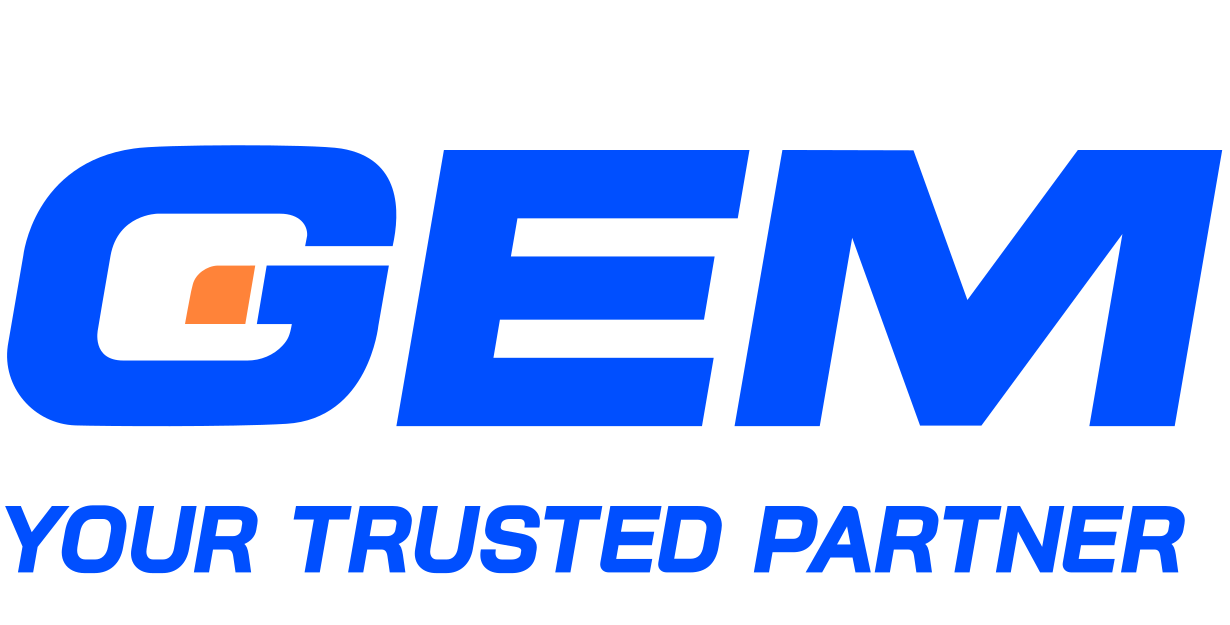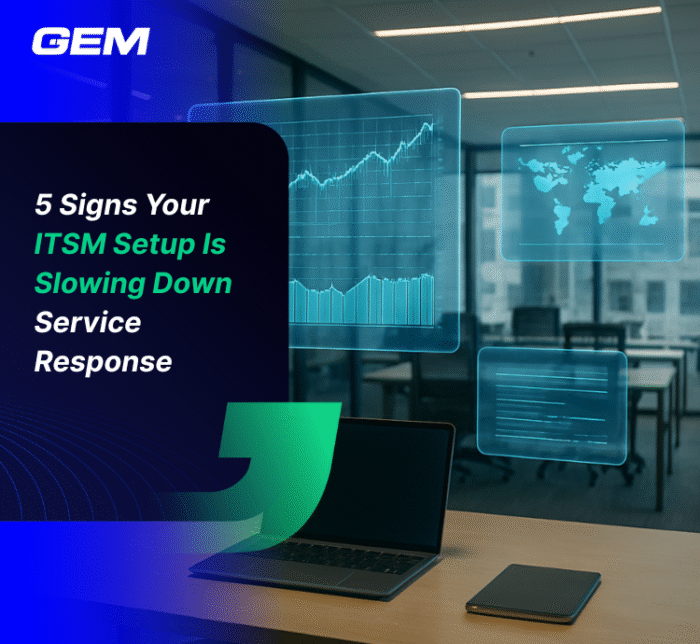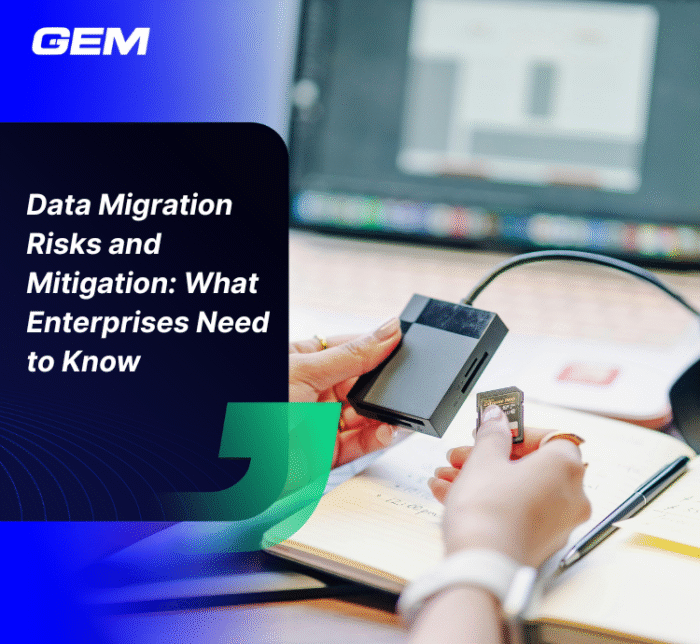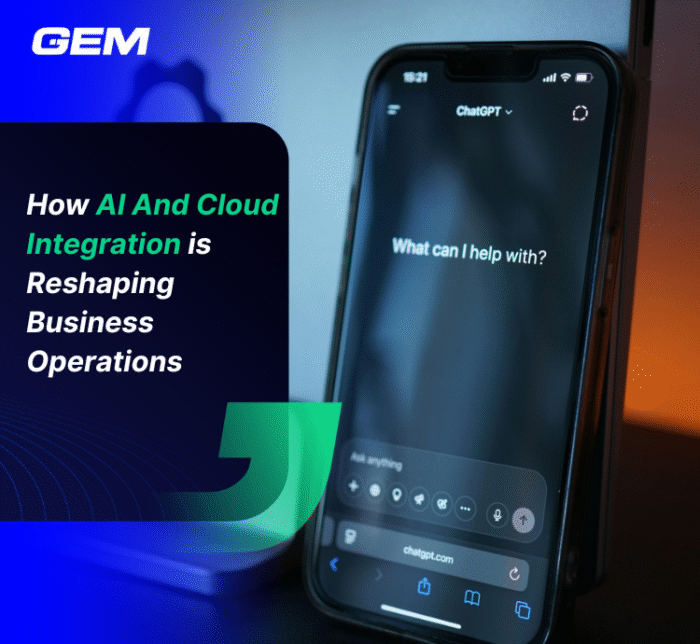Contents
- What is Top AI Cloud Business Management Platform Tools? And How They Work?
- Why Businesses Thrive with top AI Cloud Business Management Platform Tools: Key Benefits You Need to Know
- Choosing the Right AI Cloud Platform: What You Should Evaluate?
- Top 9 AI Cloud Business Management Platform Tools That Transforming Your Operations
- Your Roadmap to Finding the Right AI Cloud Business Management Platform Partner
- Why GEM is the Right Partner for AI and Cloud Management
Under pressure to remain competitive in a rapidly evolving market, businesses are grappling with challenges like operational inefficiencies, rising costs, and the inability to scale processes effectively. Traditional systems often fall short in processing vast amounts of data or delivering actionable insights in real-time. In such cases, cloud-based AI platforms – a solution increasingly viewed as the key to overcoming these hurdles. These platforms combine the power of artificial intelligence with the flexibility and scalability of the cloud, so businesses can streamline operations, reduce costs, and make data-driven decisions with precision. With over 11 years of expertise in IT and AI, backed by industry-leading professionals, we bring you insights into the top AI cloud business management platform tools.
What is Top AI Cloud Business Management Platform Tools? And How They Work?

Defining AI Cloud Business Management Platform Tools
AI cloud business management platform tools are technology frameworks designed to support the creation, deployment, and management of artificial intelligence models through cloud-based infrastructures. These platforms leverage advanced computational resources to process large datasets, automate workflows, and generate actionable insights while eliminating businesses’ need to invest in costly on-premise hardware.
How Do These Platforms Work?
AI cloud business management platform tools operate through a combination of cloud infrastructure and AI-specific tools.
The fundamental components include:
- Hosted AI Models: Pre-trained or customizable models accessible via the cloud to execute tasks such as natural language processing, image recognition, or predictive analytics.
- Cloud Infrastructure: Backed by hyperscalers like AWS, Google Cloud, and Microsoft Azure, these platforms provide scalable, high-performance computing power critical for AI workloads.
- Data Integration Pipelines: These pipelines connect with existing enterprise systems to collect and process data in real-time for accurate and reliable outputs.
- Developer APIs and Interfaces: These tools make it simpler for businesses to design AI-driven applications and integrate them directly into their operations.
>> Explore more about Natural Language Processing Companies through GoodFirms
Applications in Business Management
AI cloud business management platform tools are redefining how businesses operate by addressing critical challenges and unlocking new opportunities for growth. These platforms are commonly applied in several key areas of business management:
-
Process Automation
Repetitive tasks such as data entry, invoice processing, or shipment scheduling are often time-consuming and prone to human error. Cloud-based AI platforms improve these processes by automating workflows and minimizing manual involvement.
According to McKinsey, organizations that adopted automation experienced an average efficiency boost of 20-30%, highlighting the significant impact of this technology on operational performance.
-
Predictive Analytics
Harnessing historical data through advanced algorithms, cloud-based AI platforms equip businesses with the capability to anticipate trends, evaluate risks, and predict customer behaviors. Predictive analytics empowers companies to stay proactive and make decisions rooted in data insights.
-
Decision Support
Making impactful business decisions often demands the analysis of complex datasets in real-time. Cloud-based AI platforms simplify this process by processing massive amounts of data quickly and presenting insights that leaders can act on confidently.
Why Businesses Thrive with top AI Cloud Business Management Platform Tools: Key Benefits You Need to Know
As businesses navigate increasingly complex markets, AI cloud business management platform tools are becoming a strategic solution for achieving agility, efficiency, and data-driven growth. These platforms provide a range of benefits that are reshaping industries and empowering organizations to adapt to modern challenges.

-
Cost Efficiency
One of the most significant advantages of these AI platforms is their ability to reduce operational costs by eliminating the need for expensive on-premise infrastructure.
Traditional systems often require substantial upfront investments in hardware, maintenance, and IT support, which can strain budgets. Cloud platforms, on the other hand, operate on a pay-as-you-go model, allowing businesses to allocate resources more effectively.
-
Scalability
Cloud-based AI platforms adapt seamlessly to fluctuating business demands.
During periods of growth or seasonal spikes, businesses can scale resources up to meet demand. Similarly, resources can be reduced during slower periods to optimize costs. This flexibility makes these platforms invaluable for businesses navigating dynamic market conditions.
-
Accessibility
These platforms provide businesses with the advantage of accessing tools and data from virtually anywhere.
As remote work and global collaboration become more prominent, cloud-based AI fosters smoother operations across teams, regardless of their location. Employees and leaders can collaborate efficiently by accessing shared insights and tools on demand.
-
Speed of Deployment
Unlike traditional systems, cloud-based AI platforms are designed for rapid implementation.
With pre-configured tools and user-friendly interfaces, businesses can integrate AI capabilities into their workflows far quicker, accelerating their time to value. This speed is particularly important for organizations competing in fast-moving industries.
Save Up to 45 % of Your Team’s Time with AI
Eliminate repetitive tasks, accelerate processes by up to 50 %, and redeploy your team on strategic initiatives.
-
Data-Driven Decisions
Cloud-based AI platforms process vast datasets to generate actionable insights that directly influence business strategies.
By uncovering patterns and predicting outcomes, businesses can make informed decisions that drive growth, improve customer experiences, and identify market opportunities.
Choosing the Right AI Cloud Platform: What You Should Evaluate?

When selecting an AI cloud platform, businesses may find similarities with choosing a traditional cloud solution, such as evaluating scalability, cost, and integration. However, the introduction of AI introduces additional layers of complexity and unique considerations.
-
Integration Capabilities
For an AI cloud business management platform tool to deliver value, it must connect seamlessly with your existing systems, such as enterprise software (CRMs, ERPs) and data pipelines. Additionally, AI solutions require compatibility with machine learning frameworks and the ability to pull data from multiple sources without disruptions.
- What to Look For: Platforms offering robust APIs, pre-built connectors, and support for widely used tools such as Salesforce, SAP, or Tableau. The platform should also be able to interact with AI development tools like TensorFlow or PyTorch.
- AI-Specific Factor: Assess how easily the platform supports the deployment of AI models and integrates with data pipelines to maintain continuous learning and updates for evolving business needs.
-
Data Security and Compliance
AI introduces security challenges beyond those of traditional cloud platforms, as it often involves the use of highly sensitive data for model training and decision-making. This requires advanced security measures to protect data integrity and compliance with industry-specific regulations like GDPR, HIPAA, or CCPA.
- What to Look For: Encryption for data in transit and at rest, multi-layered access controls, and a strong framework for managing permissions. Look for platforms certified under security standards such as ISO 27001 or SOC 2.
- AI-Specific Factor: Evaluate the platform’s ability to anonymize data used in AI training while adhering to regional compliance requirements. Confirm that it provides tools for identifying and eliminating biases in AI outcomes to support ethical, accurate results.
-
Usability
Ease of use becomes even more important with AI platforms, as they often involve more complex tasks like training and deploying models. Businesses should prioritize platforms designed with user-friendly interfaces and tools that cater to both technical and non-technical teams.
- What to Look For: Intuitive dashboards, pre-configured workflows, and drag-and-drop tools that simplify AI development and deployment. Comprehensive training resources and clear documentation can also support adoption across the organization.
- AI-Specific Factor: Platforms that include pre-built AI models or templates for common use cases (e.g., demand forecasting, customer segmentation) can accelerate adoption and reduce the learning curve for teams without deep technical expertise.
-
Customization Options
AI applications often need to be tailored to fit unique business goals. A platform that offers flexibility in customizing workflows, dashboards, and algorithms can provide businesses with a competitive advantage by aligning tools with specific needs.
- What to Look For: Platforms that support the modification of AI models, allow adjustments to system configurations, and offer tools for integrating custom business logic. The ability to experiment with and fine-tune outputs without extensive coding is a significant benefit.
- AI-Specific Factor: Look for platforms that support the creation of custom machine learning pipelines or allow integration with third-party analytics tools to address niche requirements.
-
Cost
Pricing models for AI cloud platforms go beyond traditional infrastructure costs. Businesses must consider how pricing is structured for features like model training, inference, and storage. Flexible cost models such as pay-as-you-go or subscription plans can help organizations manage their budgets effectively.
- What to Look For: Transparent pricing models and detailed cost calculators that help predict expenses based on usage. Platforms that offer flexibility in scaling costs based on resource consumption are particularly valuable.
- AI-Specific Factor: Assess the cost implications of training large models, as this can require significant computational resources. Platforms that include optimization tools for resource management can help reduce unnecessary spending.
-
Vendor Support
Strong vendor support is key for leveraging the full potential of an AI cloud business management platform tool. This includes assistance with deployment, troubleshooting, and long-term optimization of AI models. Businesses should prioritize platforms backed by reliable and accessible support teams.
- What to Look For: Providers offering 24/7 technical support, detailed documentation, and access to AI experts. Platforms with dedicated account managers or onboarding programs can further assist in driving successful implementation.
- AI-Specific Factor: Evaluate whether the provider offers specialized support for AI-related challenges, such as optimizing model performance or deploying custom solutions. Access to active user communities and forums can also serve as a valuable resource.
Top 9 AI Cloud Business Management Platform Tools That Transforming Your Operations
In this key section, we will explore the 9 leading AI cloud platform tools for business management: Amazon Web Services (AWS), Google Cloud AI, Microsoft Azure AI, IBM Watson AI, Oracle Cloud AI, Baidu AI Cloud, Alibaba Cloud AI, Salesforce Einstein, and SAP Business Technology Platform (BTP). Each platform brings unique strengths, making them standout choices for organizations aiming to integrate AI into their operations.
Amazon Web Services (AWS)
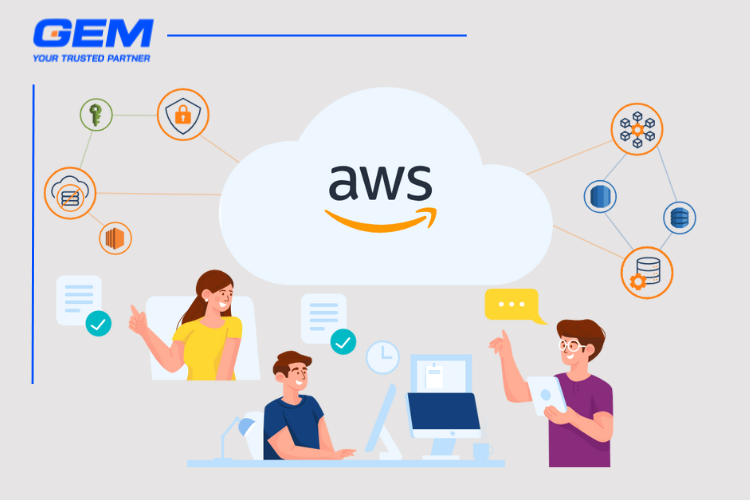
Amazon Web Services (AWS) is a dominant player in the AI cloud market, leveraging its extensive infrastructure and global reach. AWS has built an unparalleled ecosystem of AI and Machine Learning (ML) tools that cater to a range of use cases, from basic automation to complex AI model deployment. Its focus on scalability, automation, and enterprise-grade AI solutions makes it a trusted choice for businesses of all sizes.
Key Offerings
| Amazon SageMaker | A fully managed machine learning service covering the entire AI lifecycle, from data preparation to model training and deployment. SageMaker’s no-code options, such as AutoML and pre-built algorithms, make it accessible even to non-technical users. |
| AWS Lambda | A serverless service that runs AI models at scale, allowing businesses to execute code without managing infrastructure. Ideal for real-time AI tasks like fraud detection or personalized content delivery. |
| Amazon Polly | Converts text into natural-sounding speech, enabling businesses to create voice-enabled applications. |
| Amazon Rekognition | Provides AI-powered image and video analysis, with capabilities for facial recognition, object detection, and scene understanding. |
| Amazon Lex | Powers conversational AI, enabling businesses to build chatbots and virtual assistants similar to Alexa. |
Pros
- Comprehensive Ecosystem: AWS offers an extensive suite of pre-configured AI tools, allowing businesses to quickly integrate AI without deep expertise.
- Global Scalability: AWS’s infrastructure is highly scalable, supporting AI workloads of any size while maintaining reliability.
- Extensive Integrations: Seamless compatibility with other AWS services like Amazon Redshift (data warehousing), AWS IoT Core, and AWS Glue (ETL service).
Cons
- Complex Pricing: AWS’s pay-as-you-go model can become challenging to manage without a clear understanding of usage patterns.
- Steep Learning Curve: While powerful, AWS tools often require familiarity with cloud computing concepts, posing challenges for beginners.
Google Cloud AI
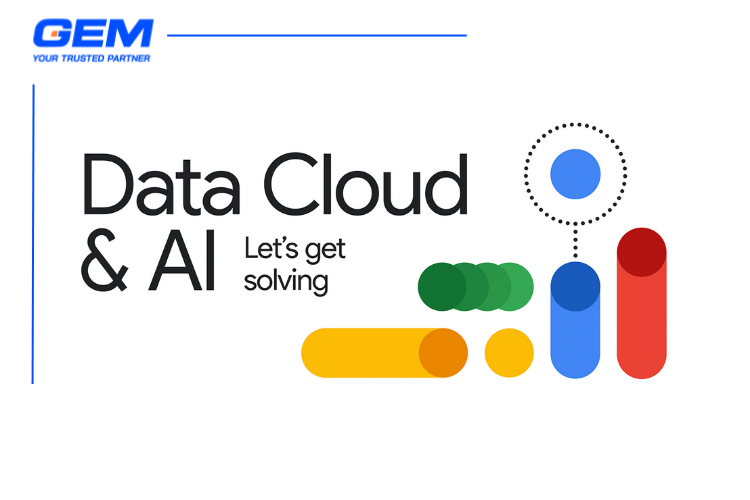
Google Cloud AI stands out due to its leadership in AI innovation and research, anchored by the company’s expertise in machine learning and deep learning technologies. Known for its state-of-the-art tools like TensorFlow and pioneering NLP advancements such as BERT, Google Cloud AI offers unparalleled capabilities for businesses aiming to leverage cutting-edge AI.
Key Offerings
| Vertex AI | A unified AI platform that simplifies the end-to-end AI workflow. Vertex AI offers tools for training, deploying, and monitoring ML models, all in one place, with support for MLOps practices. |
| Cloud AutoML | Enables businesses to train custom ML models without requiring in-depth expertise. This tool is particularly useful for building tailored AI solutions in industries like retail or healthcare. |
| TensorFlow Enterprise | Optimized for production-grade AI, TensorFlow Enterprise provides support for deploying TensorFlow models at scale with enterprise-level reliability. |
| Google AI Hub | A marketplace of reusable ML models and pipelines, allowing teams to share and collaborate on AI assets. |
Pros
- Advanced NLP and Vision Tools: Google’s AI technologies, such as BERT and DeepMind, are integrated into its platform, offering robust natural language understanding and computer vision capabilities.
- AI-First Infrastructure: Google Cloud is optimized for AI workloads, with tools like BigQuery ML enabling seamless data analysis.
- Hybrid and Multi-Cloud Support: Anthos allows businesses to manage workloads across hybrid environments, reducing vendor lock-in risks.
Cons
- Requires Expertise: While tools like AutoML reduce complexity, more advanced features demand skilled professionals to fully unlock their potential.
- Documentation Gaps: Some users report limited documentation for advanced tools, making onboarding more challenging for teams.
Microsoft Azure AI
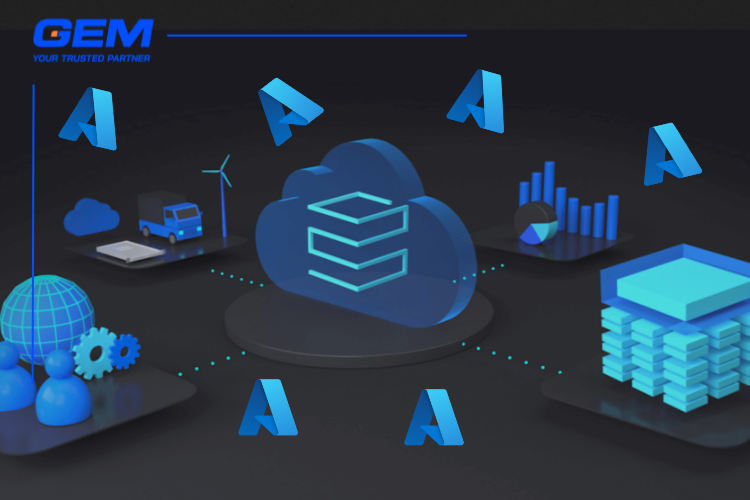
Microsoft Azure AI leverages its extensive enterprise software experience to offer a robust AI platform. Azure’s tools are designed to integrate seamlessly into the existing Microsoft ecosystems like Office 365 and Dynamics 365, making it a natural choice for businesses already embedded in the Microsoft environment.
Key Offerings
| Azure Machine Learning | A fully managed service for building, training, and deploying machine learning models. It supports collaboration between data scientists and engineers with tools like Azure ML Designer. |
| Cognitive Services | Pre-built APIs for tasks like sentiment analysis, facial recognition, and speech-to-text conversion. |
| Azure OpenAI Service | Gives businesses access to advanced generative AI models like GPT-3.5, enabling applications in content creation, summarization, and coding assistance. |
| Azure AI Vision | Provides tools for analyzing images and videos, including custom model training. |
Pros
- Enterprise Integration: Seamlessly connects with Microsoft products, streamlining workflows across tools like Excel, Power BI, and Dynamics CRM.
- Regulatory Compliance: Azure’s strong emphasis on security and compliance makes it a top choice for industries like healthcare and finance.
- Open-Source Support: Compatibility with TensorFlow, PyTorch, and other open-source frameworks ensures flexibility for developers.
Cons
- Complexity: Some tools require significant customization to align with specific business needs.
- Cost Management: As with other platforms, costs can escalate for large-scale deployments without careful planning.
IBM Watson AI
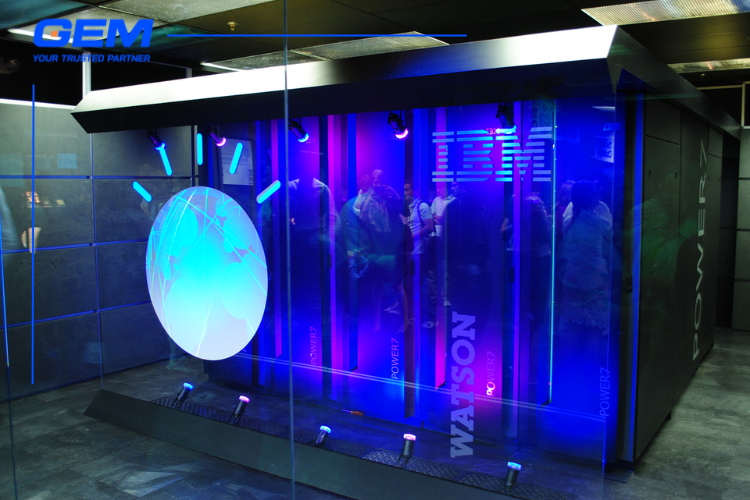
IBM Watson AI is known for its pioneering role in AI, particularly in natural language processing and machine learning. With a focus on explainable AI and industry-specific solutions, Watson is an excellent choice for businesses in healthcare, finance, and other regulated industries.
Key Offerings
| Watson Studio | A collaborative environment for developing and training AI models. |
| Watson Assistant | Supports businesses to create conversational AI solutions for customer support and virtual assistants. |
| Watson Natural Language Understanding | Pre-trained models for text analysis, sentiment detection, and language processing. |
| WatsonX | The next-generation AI platform focusing on generative AI for creating advanced text and language-based applications. |
Pros
- Transparency: Watson emphasizes explainability in AI models, allowing businesses to track and understand decision-making processes.
- Industry-Specific Solutions: Tailored tools address unique challenges in verticals like healthcare, retail, and manufacturing.
- Hybrid Cloud Integration: Watson integrates with IBM’s hybrid cloud infrastructure, offering flexibility in deployment.
Cons
- Cost: Pricing is often higher compared to competitors, particularly for small businesses.
- Steeper Learning Curve: Watson tools can require specialized expertise to fully utilized.
Oracle Cloud AI

Oracle Cloud AI combines advanced data analytics with automation to help businesses unlock the potential of their data. As one of the most trusted database providers in the world, Oracle seamlessly integrates its AI tools with its broader ecosystem of business applications, making it an ideal solution for organizations already relying on Oracle’s software suite.
Key Offerings
| Oracle AI Platform Cloud Service | A managed environment for building, training, and deploying machine learning models. It simplifies workflows with features like AutoML, integrated Jupyter Notebooks, and tools for model management. |
| Oracle Autonomous Database | Combines database management with AI capabilities, helping businesses analyze data and automate decision-making. |
| Oracle AI Services | Pre-built tools for tasks like text analysis, image recognition, and anomaly detection. |
| OCI Data Science | A collaborative workspace for data scientists, offering pre-built algorithms, scalable compute resources, and tools for team collaboration. |
Pros
- Strong integration with Oracle’s existing database solutions, allowing businesses to apply AI directly to their transactional data.
- Comprehensive data lifecycle management tools, including labeling, training, and deployment.
- Advanced monitoring tools like Oracle Cloud Infrastructure Monitoring for tracking the performance of deployed models.
Cons
- Primarily benefits businesses already using Oracle’s ecosystem, which may limit its appeal for others.
- Pricing complexity may deter smaller organizations.
Baidu AI Cloud

Baidu AI Cloud is a leading AI platform in China, offering a wide range of services tailored to the local market. Leveraging Baidu’s expertise in search, natural language processing (NLP), and speech recognition, the platform provides unique solutions for businesses operating in the region.
Key Offerings
| Baidu AI Studio | A development platform for creating and deploying AI applications. |
| DuerOS | A conversational AI platform designed for voice-based applications, enabling businesses to build tailored virtual assistants and smart devices. |
| PaddlePaddle | An open-source deep learning framework optimized for NLP and computer vision tasks. |
Pros
- Specialized Chinese language processing capabilities, making it ideal for businesses targeting the Chinese-speaking market.
- Strong support for IoT applications, enabling the integration of AI with connected devices.
- Comprehensive tools for speech recognition and voice interaction.
Cons
- Limited reach outside of China, making it less suitable for global operations.
- Heavy reliance on Baidu’s ecosystem, which may limit flexibility.
Alibaba Cloud AI

Alibaba Cloud AI has emerged as a leader in AI-driven solutions for the Asia-Pacific region. Backed by Alibaba’s extensive experience in e-commerce and big data, the platform offers powerful AI tools designed to optimize operations, particularly for retail, logistics, and customer service.
Key Offerings
| PAI (Platform for AI) | An end-to-end machine learning platform for building and deploying AI models. |
| PAI-iTAG | A data labeling service for various data types, including images, text, and video, with both predefined and customizable templates. |
| PAI-DLC | A cloud-native platform for deep learning and model training, compatible with multiple frameworks. |
| PAI-EAS | A deployment tool that ensures high performance for large-scale models, featuring real-time elastic scaling. |
Pros
- Dominance in the Asia-Pacific region, offering localized support and services.
- Strong focus on integrating AI with big data, making it ideal for businesses handling large datasets.
- Tailored tools for e-commerce, logistics, and retail operations.
Cons
- Limited appeal outside the Asia-Pacific market.
- Some services may require customization for specific use cases.
Salesforce Einstein
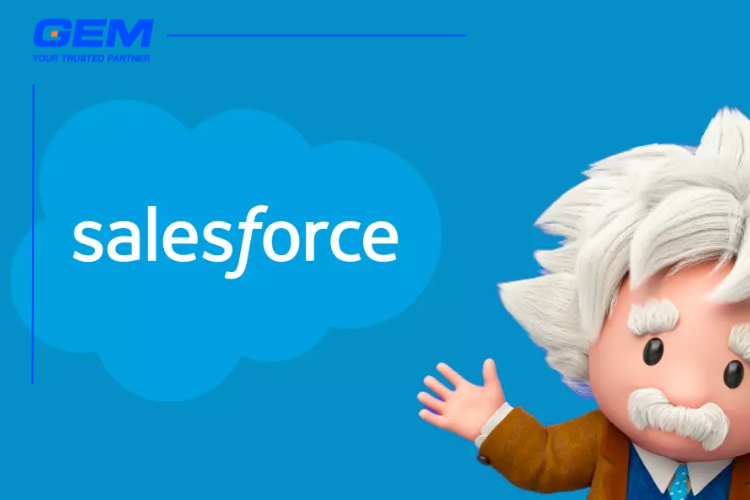
Salesforce Einstein is an AI platform embedded within Salesforce’s CRM ecosystem, designed to enhance customer relationship management through automation and predictive insights. It leverages Salesforce’s vast customer data to improve marketing, sales, and customer support processes.
Key Offerings
| Einstein AI | Provides machine learning and deep learning capabilities to enhance CRM activities. |
| Einstein Vision | Computer vision APIs for tasks like image recognition in sales and marketing. |
| Einstein Language | NLP tools for text analysis, customer sentiment detection, and automated responses. |
| Einstein GPT | Generative AI capabilities integrated directly into Salesforce apps for creating personalized customer interactions. |
Pros
- Seamless integration with Salesforce CRM, enabling businesses to leverage AI without additional complexity.
- Real-time predictions and insights based on customer data, improving decision-making.
- Automated machine learning tools, reducing the need for manual model management.
Cons
- Limited flexibility outside the Salesforce ecosystem, making it less appealing for businesses not already using Salesforce CRM.
- Higher costs associated with Salesforce’s enterprise-level pricing.
SAP Business Technology Platform (BTP)
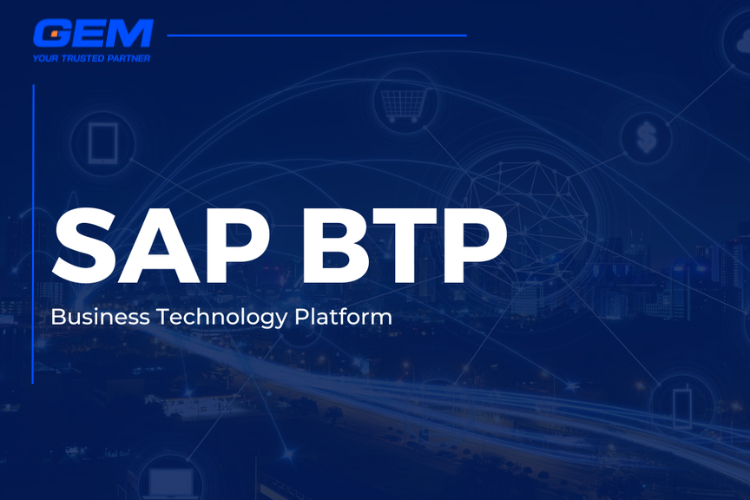
SAP BTP is a comprehensive platform that combines AI, analytics, and data management to drive business transformation. It is designed to integrate seamlessly with SAP’s enterprise applications, making it an attractive option for businesses already using SAP solutions.
Key Offerings
| SAP AI Core | Provides tools for building, deploying, and managing AI models at scale. |
| SAP AI Business Services | Pre-built services for tasks like document processing, customer sentiment analysis, and predictive forecasting. |
| SAP Data Intelligence | A platform for managing data integration and orchestration across hybrid and multi-cloud environments. |
| SAP Analytics Cloud | Combines AI and analytics to deliver actionable insights for decision-making. |
Pros
- Deep integration with SAP’s enterprise applications, such as SAP S/4HANA and SAP SuccessFactors.
- Comprehensive tools for managing data pipelines and AI workflows.
- Strong focus on governance and compliance.
Cons
- Best suited for organizations already using SAP solutions, limiting its appeal to new users.
- Requires significant investment to unlock its full potential.
Explore: AI Chatbot
Your Roadmap to Finding the Right AI Cloud Business Management Platform Partner

Typically, businesses in sectors outside of IT face challenges when implementing a new platform, especially one as advanced as an AI cloud business management platform tool. This section will outline practical steps you can take to identify a reliable management provider while ensuring that all your needs are addressed.
Step 1: Define Your Goals and Challenges
Start by understanding the specific outcomes you want to achieve with AI and cloud technologies. Identifying your operational pain points, inefficiencies, or growth opportunities will help you outline the scope of services you require from a partner.
Focus Areas:
- Articulate measurable objectives, such as improving data analytics, reducing operational costs, or scaling existing AI capabilities.
- Map out your current infrastructure and workflows to identify gaps or inefficiencies requiring attention.
- Identify areas where expert support will have the highest impact, such as cloud migration, AI model deployment, or security.
Step 2: Assess Provider Expertise and Offerings
A strong management partner brings proven experience, a comprehensive service portfolio, and a history of delivering results in AI and cloud projects. Look for a provider with capabilities that align with your industry, operational scale, and technology stack.
What to Evaluate:
- Experience across multi-cloud systems, hybrid environments, and AI frameworks like TensorFlow or PyTorch.
- Availability of services such as AI model development, cloud migration, and customized optimization.
- Case studies or references that demonstrate success in projects similar to your requirements.
Step 3: Prioritize Seamless Integration
Your chosen partner should offer solutions that integrate smoothly with your existing systems, minimizing disruptions while maximizing operational efficiency. Compatibility across enterprise tools, data systems, and AI platforms is essential.
Key Considerations:
- Does the provider offer APIs or pre-built connectors for easy integration with your current tools (e.g., CRMs, ERPs, or data platforms)?
- Can their solutions handle both legacy and modern systems, providing flexibility as you scale?
- Do they provide reliable tools for managing hybrid cloud setups or multi-cloud environments.
Imagine What You Could Achieve with AI Streamlining Your Operations
Transform your operations with precise, AI-driven workflows. From reducing errors to improving speed, achieve operational excellence and drive sustainable growth.
Step 4: Evaluate Security and Compliance Standards
Data protection and regulatory compliance are critical when working with AI and cloud platforms, especially for industries like healthcare, finance, and retail. A trustworthy partner should demonstrate a strong commitment to security.
Inquire About:
- Encryption protocols, access controls, and data governance frameworks.
- Adherence to regulatory standards like GDPR, HIPAA, or CCPA.
- Tools for identifying and managing risks in AI model training and deployment.
Step 5: Look for Scalability and Long-Term Flexibility
As your business evolves, your partner should provide scalable solutions that adapt to your changing needs. This includes accommodating increased workloads, adopting emerging technologies, and supporting new use cases.
What to Check:
- Does the partner offer scalable resource allocation to support growth or seasonal demand?
- Are their solutions aligned with future trends in AI and cloud innovation?
- Can they adapt their services as your operational requirements shift?
Step 6: Review Support and Collaboration Capabilities
Ongoing support and a collaborative approach are essential for optimizing platform performance. A reliable partner will provide access to resources, proactive communication, and dedicated teams to drive long-term success.
Key Questions:
- Do they offer round-the-clock support and clear escalation procedures for critical issues?
- Are their services backed by technical training, documentation, and proactive updates?
- How do they foster collaboration to align their solutions with your goals?
Why GEM is the Right Partner for AI and Cloud Management

GEM combines technical expertise with a collaborative approach to help businesses achieve their AI and cloud goals.
With a comprehensive portfolio of services, GEM specializes in:
- Cloud Migration and Optimization: Simplifying transitions to cloud environments while maximizing efficiency.
- AI-Powered Solutions: Developing tailored generative AI, predictive analytics, and data-driven insights.
- Multi-Cloud Management: Ensuring seamless operations across multiple platforms with robust tools and strategies.
- Security and Compliance: Prioritizing data protection and regulatory alignment throughout every solution.
Find the AI Solution That Fits Your Business Perfectly
Confused about the right AI approach? Let us help you uncover a solution tailored to your goals and challenges.
GEM’s commitment to innovation, scalability, and client-focused collaboration makes it the perfect partner to manage your AI/cloud platform needs.
AI cloud business management platform tools are revolutionizing industries, enabling automation, data-driven insights, and scalable solutions. To capitalize on these benefits, businesses must carefully evaluate platforms for scalability, integration, security, and alignment with their goals. Beyond the platform itself, partnering with a skilled development provider is critical. A trusted partner brings technical expertise, optimizes workflows, ensures seamless integration, and provides ongoing support to maximize the platform’s potential. By combining the right platform with the expertise of a reliable partner, businesses can drive innovation, improve efficiency, and achieve sustainable growth in today’s competitive landscape.
Unlock the full potential of cloud-based AI business management with GEM’s tailored solutions and expert guidance.
>> SERVICE: CLOUD MIGRATION
Contact GEM today!
to explore how our innovative platforms and development partnerships can:
- Drive growth
- Streamline operations
- And future-proof your business.
